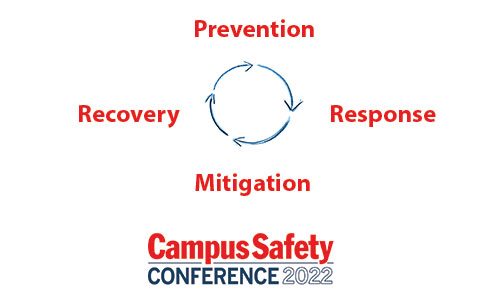Campus emergency planning is multifaceted and includes four phases: prevention, response, mitigation, and recovery. Often, incident response plans largely concentrate on the response phase and neglect the remaining key phases.
While a campus’ coordinated response during an emergency is critical to mitigating loss, it’s moot if the other phases are neglected. All phases are mutually exclusive and depend on the success of the others to be successful themselves.
Each of this summer’s Campus Safety Conferences, happening June 20-22 in Bethesda, Md., July 18-20 in Fort Worth, Texas, and August 2-4 in Los Angeles, will address all four phases. Experts will speak on various topics that will challenge campus safety and security professionals to ensure their emergency response plans are thorough and implement current leading practices.
While K-12 schools and colleges differ significantly in many aspects, they all have to plan for the potential for crises, including medical emergencies, severe weather, communicable diseases, and acts of violence, among others. Through education and networking with peers who are facing similar challenges, attendees will leave feeling empowered, ready to embrace resilience, and prepared to take decisive action when they return to their campuses.
Here’s a breakdown of some of the different sessions the Campus Safety Conferences will cover and which phase of emergency planning they address. We’ve combined mitigation and recovery sessions as many of the conversations surrounding those phases overlap.
For more information on the conferences or to register, visit CampusSafetyConference.com.
Prevention
- Latest Trends Among the Young; happening at East only
- Enhancing Student Mental Health and Wellness Supports Through Technology; happening at all 3 locations
- Trends in ID Card Printing; happening at East only
- Defend Your Glass: How to Protect Your Building’s Weakest Points from Forced Entry, Bomb Blasts, Windstorms, and Seismic Events; happening at East and Texas
- Getting Buy-in for Your Campus Security & Safety Programs: Sage Advice from Past Directors of the Year; happening at all 3 locations
- Necessary Steps: How to Plan and Implement a Smart Campus Security Program for Today and the Future; happening at East only
- Suicide Prevention for Students of Color: Heartbreaking Lessons Learned; happening at all 3 locations
- When Dating Hurts: What a Family Learned About Dating Violence After Their Daughter’s Tragic Death; happening at East only
- Clery & Crisis: Communications That Protect your Campus Population; happening at East and West
- School Safety and You: Tools to Address Emerging Threats in the K-12 Community; happening at all 3 locations
- In the Trenches: Moving from Initial Threat Assessment to Management Via the Tandem Work of Practical Strategies and Policy/Compliance; happening at all 3 locations
- Your Active Incident Response Plans Are Likely to Fail: Why and What You Can Do to Fix Them; happening at East only
- Mental Health IS Health: Tackling Mental Health Needs in Higher Education; happening at all 3 locations
- Mental Health IS Health: Tackling the Mental Health Needs of K-12 Students AND Staff; happening at all 3 locations
- Human Trafficking on K-12 and College Campuses; happening at East and West
- Digital Threat Assessment® – The Missing Link for School Safety and Threat Assessment Teams; happening at all 3 locations
- The Challenges and Advantages of a Comprehensive Public Safety Program; happening at Texas only
- Futureproofing Card Issuance: Transitioning from Desktop to Cloud-Based Card Issuance Software; happening at Texas only
- The Role of Culture and Climate in Campus Security; happening at West only
- Integrated School Security – What Leaders Need and Want to Know; happening at West only
- The Next Generation of School Safety: Balancing Security with Learning Environments; happening at West only
Response
- Building an Active Shooter Response Architecture; happening at East and Texas
- Sandy Hook Public Information Officer Gives Actionable Insight from Tragedy; happening at all 3 locations
- First Responders, Secondhand Information: Addressing Communication Challenges During a Crisis – Lessons Learned from the Ft. Detrick Shooting; happening at East and Texas
- K-12 Student/Parent Reunification; happening at all 3 locations
- Situational Awareness: Scenario Training and Tabletop Exercises; happening at all 3 locations
- Responding to Students with Autism – Tips and Strategies for Law Enforcement and School Officials; happening at Texas and West
- Why Your Campus Is Not Ready for an Active Shooter Incident; happening at Texas only
- Redefining School Policing: The Partnership Between Officers and Social Workers; happening at Texas only
- Beyond Threat Assessment: Decision-Making for Leaders; happening at Texas only
- Staff with Concealed Weapons on Campus: Security Enhancement or Liability?; happening at Texas only
- How to Effectively Deescalate Violent Confrontations; happening at West only
- Preparing for the Worst: Creating a Usable Exercise to Reduce Risks & Improving Timely Warning & Emergency Notification Programs; happening at West only
Mitigation & Recovery
- Time to Call on the Bullpen: Addressing Staffing and Resource Concerns; happening at East only
- Trauma-Informed Campus Policing; happening at East and West
- Multiple Threats, One Solution: Bridging the Gap Between Fire and ENS; happening at all 3 locations
- Tips for Successfully Working with Your Local Media During a Crisis; happening at all 3 locations
- Why Your Campus Is Not Ready for an Active Shooter Incident; happening at Texas only
- Secondary Traumatic Stress for Educators and Law Enforcement; happening at Texas and West













